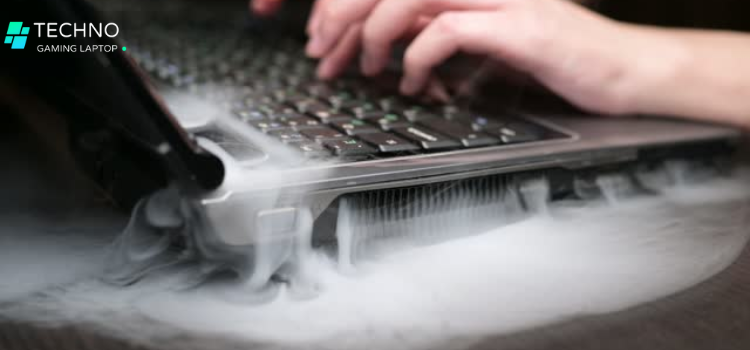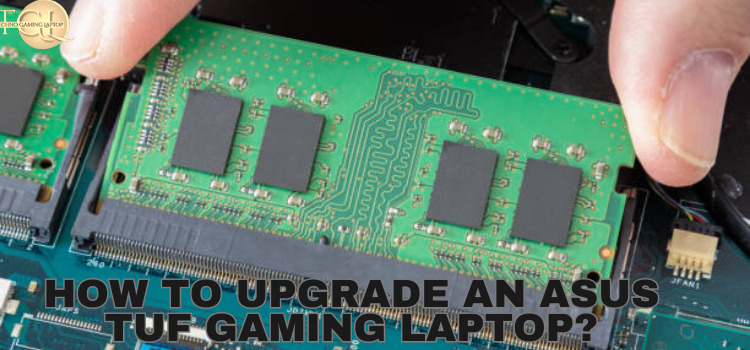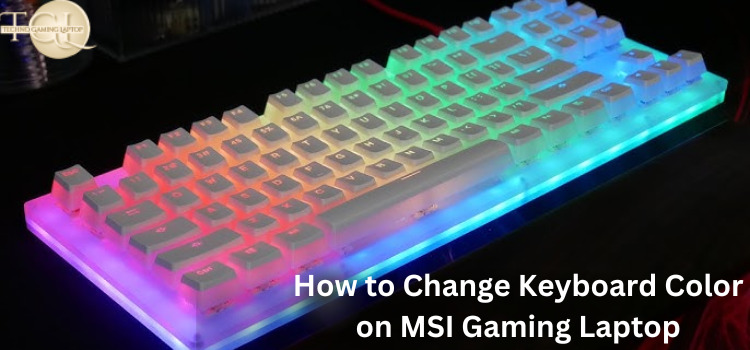Gaming Laptop are designed to handle intense gaming sessions but at the same time these laptops generate lot of heat if you did not manage it properly, this heat affect the performance of your system even damages your laptop’s internal components gradually. If you want your laptop running its best, it is important to implement effective cooling strategies to make it cool.
Use a cooling pad, elevate laptop for airflow, clean vents regularly, limit background processes, and avoid blocking air intakes/exhausts.
If you want that gaming laptop, give you the best gaming experience and get a long life, so here is a guide on how to keep your gaming laptop cool with a long life. So, let’s discover essential tips and tricks to maintain optimal temperature and performance without worries.
Methods How to keep gaming laptop Cool
Here is a way to Keep your laptop cool is crucial for maintaining its performance and longevity. Here are two main methods with steps to help you achieve optimal performance and prevent potential hardware damage due to overheating.
Method 1: External cooling solution
A laptop cools while gaming uses a cooling pad. This device is designed to dissipate heat from the laptop and improve airflow.
Choose a Cooling Pad:
Research and select a cooling pad that fits your laptop size and has good reviews.
Position Your Laptop:
Place your gaming laptop on the cooling pad. Ensure it aligns well with the fans on the pad.
Connect the Cooling Pad:
Connect the pad to your laptop, usually via a USB port, to power its fans.
Adjust Fan Speeds (if applicable):
Some cooling pads allow you to adjust laptop fans speeds. Experiment to find the best balance between cooling and noise.
Regular Cleaning:
Keep the cooling pad clean from dust to maintain optimal performance.
Method 2: Software And Hardware Optimization For Internal Cooling
1. Optimize in-Game setting:
- Lower graphic and fps setting to reduce the strain on your laptop GPU(graphic processing unit) and CPU (Central processing Unit)
- Lowering resolution and turning of features like anti-aliasing can decrease the work load on you hardware, resulting in less heat generation.
2. Clean the Vents and Fans:
- Turn off your laptop and unplug it.
- Use compressed air to blow out dust from the vents and cooling fans. This allows cool air to flow.
- Dust accumulation can hinder airflow, cause laptop is overheating.
3. Update Your BIOS and Drivers:
- Ensure your BIOS and graphics drivers are up to date for optimal cooling management.
- Check updates for other essential drivers such as chipset and processor drivers, to keep your system running efficiently.
4. Adjust Power Settings:
- Go to ‘Power Options’ in your control panel.
- Set your laptop to a balanced or power-saving mode to reduce heat.
5. Use Thermal Paste (Advanced):
- Reapply thermal paste on the CPU and GPU for better heat dissipation. This step requires technical know-how.
6. Use cooling Software:
- Install software that allows you to control and monitor your laptop’s temperature such MSI after burn or fan speed.
Other Methods
1. Keep it Cool environment:
- Game in a well-ventilated room and avoid placing the laptop on soft surfaces like beds or couches.
2. Undervolting:
- If your laptop allows, consider undervolting your CPU. This involves lowering the voltage supplied to CPU, reduce heat generation without sacrificing the performance.
Read Now : MY LAPTOP GETS HOT WHILE GAMING?
Reasons Why your Laptop causes overheating issue
Dust Accumulation:
Over time, dust can accumulate inside your laptop, clogging up the cooling system and reducing its efficiency.
Intensive Gaming Sessions:
Playing graphically demanding games for extended periods generates a lot of heat.
Inadequate Ventilation:
Placing your laptop on soft surfaces like beds or couches can block air to flow, causing overheating and your laptop is getting hot.
Outdated Drivers:
Outdated graphics and chipset drivers can lead to inefficient heat management. Use reputable software to monitor and control fan speed.
Overclocking:
Overclocking your GPU or CPU can increase performance but also generate more heat.
Multitasking:
Running multiple applications in laptop while gaming increases the load on your laptop’s hardware, leading to overheating.
Blocked Air Intakes/Exhausts:
Ensure that air intakes and exhausts are not blocked by objects or dust.
High Ambient Temperatures:
Games run hot environment puts additional stress on your laptop’s cooling system.
Inadequate Cooling Solutions:
Some gaming laptops may have subpar cooling systems, leading the laptop overheating.
Aging Hardware:
Older laptops may have worn-out thermal paste or aging fans, contributing to overheating.
Read Now : WHY ARE GAMING LAPTOPS SO EXPENSIVE? (8 REASON)
Expert Tips and Tricks for Efficient Cooling
Professional Advice
- Ensure Proper Ventilation: Always use your laptop on a hard, flat surface. Soft surfaces like beds or laps can block air vents, leading to overheating.
- Limit Intensive Tasks: Running multiple high-demand applications simultaneously can overheat your laptop. Try to limit resource-intensive tasks when possible.
- High-Quality Thermal Paste: Consider applying a good thermal paste to the CPU and GPU. This improves heat conduction from the processors to the heat sink.
- Avoid Direct Sunlight: Keep your laptop away from direct sunlight and hot environments to prevent additional heat stress.
- Consider External Fans: For high-performance gaming, external fans can be attached to specific hot spots like the CPU and GPU areas for targeted cooling and prevent overheating.
Lesser-Known Cooling Hacks
- DIY Cooling Stand: Create a custom cooling laptop stand with built-in fans. Use a perforated board and attach small PC fans underneath, powered by a USB connection.
- Heat Absorbing Crystals: Some DIY enthusiasts use non-toxic crystalline substances that absorb heat. These can be placed around the laptop’s hottest parts.
- Ice Packs: Wrap a thin ice pack in a towel and place it under the laptop. Be cautious to avoid any moisture entering the laptop.
- Ventilation Boost with Objects: Elevate the rear of your laptop using small objects like rubber door stops. This can improve airflow under the laptop.
- Copper Coin Method: Stack copper coins (excellent heat conductors) on the hot spots of your laptop. This can help dissipate heat more effectively.
- External Heat Sinks: Attach additional heat sinks externally over hot spots, such as the CPU and GPU areas, to draw out more heat.
- Phase Change Materials: Use pads made of phase change materials (PCMs) that absorb heat as they melt and release it as they solidify, maintaining a stable temperature.
- Cooling with Household Fans: Point a standard household fan towards the laptop’s intake and exhaust vents for improved air circulation.
- Custom Air Ducts: Create makeshift air ducts using cardboard or plastic to direct cool air from an air conditioner or fan directly to the laptop.
- Water Cooling Kits: Though complex, water-cooling kits can be adapted for laptop use, providing superior cooling for intense gaming sessions for gamers.
Benefit of Laptop cooling
- Enhanced Performance: You’ll experience smoother gameplay with higher frame rates and fewer lag issues.
- Extended Lifespan: A well-cooled laptop will last longer, saving you money on replacements.
- Reduced Noise Levels: Cooler laptops run quieter, enhancing your gaming experience and reducing distractions.
- Prevention of Throttling: Cooling prevents throttling, ensuring consistent and reliable gaming performance.
- Protection from Heat-Related Issues:Help keep your laptop cool when gaming, from heat-induced problems.
- Energy Efficiency: You’ll lower your electricity bills while gaming responsibly.
- Comfortable Gaming Experience: A cool laptop ensures a comfortable and enjoyable gaming session.
- Less Frequent Cleaning: Regular cooling reduces the need for frequent cleaning and maintenance.
- Consistent Frame Rates: You’ll enjoy a smoother and more immersive gaming experience.
- Peace of Mind: You can focus on gaming without worrying about laptop overheating issues.
Read Now : WHY DOES MY GAMING LAPTOP BATTERY DRAIN SO FAST?
Troubleshoot Tips for Keeping Your Gaming Laptop Cool
Monitor CPU and GPU Temperatures:
- Install a temperature monitoring tool to track the CPU and GPU temperatures in real-time.
- Identify if temperatures are consistently high during gaming.
Intensive Background Processes
- Close unnecessary background applications and processes, especially resource-intensive ones. Task Manager (window) or activity Monitor (Mac) can help you to identify these processes
Update Graphics Drivers:
- If your graphic driver is Outdated or corrupt it can cause cooling problems. So Visit the manufacturer’s website and install the latest graphics drivers for your laptop’s GPU.
Optimize game setting.
- High graphics settings can strain your laptop’s hardware components, causing overheating laptop. Lower in-game graphics settings to reduce the load on your GPU and CPU.
Use Compressed Air
- Hold the Can Upright: When using compressed air, hold the can upright to avoid spraying any liquid.
- Blow in Short Bursts: Use short bursts of air to prevent excessive spinning of the laptop’s fans.
- Clean the Vents: Pay special attention to the vents and fan blades. These areas tend to collect the most dust.
Inspect Cooling System:
- If all else fails, it’s time to inspect your laptop’s cooling system.
- Open your laptop (if comfortable doing so) and check for any loose or disconnected cooling components. Ensure the thermal paste is applied correctly on the CPU and GPU.
Conclusion
My final thoughts about How to Keep gaming laptop cool is crucial for maintaining peak performance and prolonging the lifespan of your device. Utilize cooling solutions and software optimization for curing additional heat, unobstructed ventilation, reduce CPU and GPU load, keeping drivers updated and playing in a cooler environment.
These basic things must be in your mind when you are facing overheating issues in your system and other methods and troubleshoots which are already mentioned by following these tips and methods, I can ensure that your laptop remains a powerful and reliable tool for your gaming and professional needs.
Frequently Ask Questions
Q1. How can I decrease laptop heat while gaming?
Answer: Things to remembers for reducing laptop from overheating.
1. Many laptops have their air vents on the bottom or sides so don’t put laptop on bed or couch.
2. Purchasing a laptop cooling pad can be a great help too.
3. Don’t forget to clean the vents regularly.
4. Keep an eye on your laptop’s temperature to catch any potential overheating issues early on.
Q2. What temperature is the worst for a gaming laptop?
Answer: If your CPU hit 190 degrees, it’d be destroyed, well beyond the 80–90-degree safe range for most brands and types.
Q3. What are the common reasons for a gaming laptop to overheat?
Answer: There are several reasons but few main reasons are Inadequate airflow, heavy CPU/GPU use, dust buildup, and insufficient internal component cooling can all contribute to overheating issues during gaming.
Q4. Are there specific steps to keep a gaming laptop cool while gaming?
Answer: To keep your gaming laptop cool while gaming, you can use a combination of methods such as placing the laptop on a hard surface, using a laptop cooling pad, ensuring proper ventilation, and monitoring the internal temperatures.
Q5. How can the thermal paste help keep your gaming laptop cool?
Answer: Apply or replace it to maintain lower temperatures, prevent overheating, and optimize your gaming laptop’s performance by enhancing cooling system contact.





